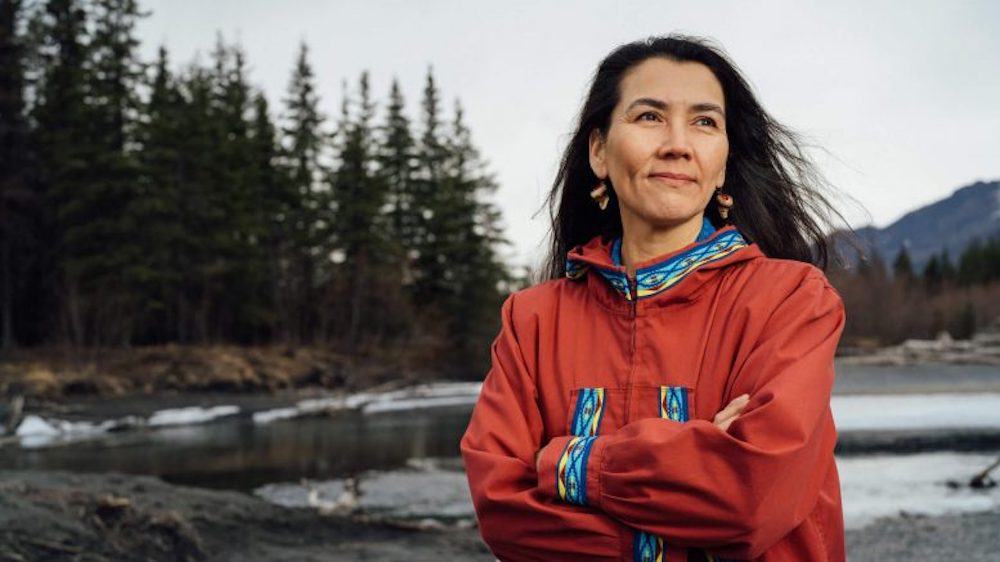
- Details
- By Jenna Kunze
Congressional candidate and elect Mary Peltola (Yup’ik) is on track to fill the state’s congressional at-large seat made vacant by Congressman Don Young’s unexpected death in March 2022.
In unofficial results counted by early Wednesday from 96% of all precincts, Peltola brought in more than 100,500 votes—claiming about 47% of the vote for Alaska’s single U.S. House seat. Former Republican Gov. Sarah Palin was in second place with about 27%. Under Alaska’s new ranked choice voting system, results aren’t final until a candidate has garnered more than 50% of votes. If the leading candidate doesn’t cross that threshold, the winner will be determined by second and third-choice votes, which will be tallied by election officials on Nov. 23. Votes from fifteen precincts have yet to be counted.
“I am honored that so many Alaskans have entrusted me with their votes,” Peltola said today in a statement. “No matter who ends up winning or losing this race, I hope we will all work together to solve Alaska’s urgent problems in the coming weeks, months, and years. My campaign has never been about partisan politics. It has always been about Alaska’s future.”
Peltola, 49, made history as the first Alaska Native member of Congress and the first Democratic woman to represent Alaska in the U.S. House of Representatives when she beat out Alaska governor and GOP vice presidential candidate Sarah Palin in the special election held in August. She was sworn in on September 13, 2022. Peltola is only the fifth person to represent the state in the House since Alaska gained statehood in 1959.
Less than two weeks after being sworn in, Rep. Petola introduced her first piece of legislation — the Food Security for all Veterans Act (H.R.8888), which calls for the creation of an Office of Food Security within the Department of Veterans Affairs. On Wednesday, Sept. 21, the bill was voted out of the House's Veterans Affairs committee. After three weeks on the job, Peltola worked with Republican Senators Dan Sullivan and Lisa Murkowski to pressure the Biden Administration to fully fund disaster relief support after a major storm devastated primarily Native communities in Western Alaska.
The focus of Peltola’s campaign has been “fish, family and freedom” for all Alaskans.
“My relationship to salmon goes back to my mother and our language,” Peltola told Native News Online in an August interview. “The generic word for fish is also a generic word for food. Fish is a huge part of our diet. Being a Yup’ik person meant putting up hundreds and hundreds of fish for the winter that would take us through the winter. Dry salmon is a huge part of our diet. And it's something that we've been missing for the last 13 years.”
She added that being pro-fish is about “talking about precautionary management, considering the low ocean productivity, as well as adaptive management.”
In the race for the U.S. Senate, results show incumbent candidate Lisa Murkowski closely behind her challenger and fellow Republican Kelly Tshibaka.
More Stories Like This
Native News Weekly (August 25, 2024): D.C. BriefsUS Presidents in Their Own Words Concerning American Indians
Native News Weekly (January 18, 2026): D.C. Briefs
Federal Judge Orders ICE to Halt Use of Pepper Spray, Arrests of Peaceful Protesters in Twin Cities
Tunica-Biloxi Cultural Leader John D. Barbry Walks On
Help us defend tribal sovereignty.
At Native News Online, our mission is rooted in telling the stories that strengthen sovereignty and uplift Indigenous voices — not just at year’s end, but every single day.
Because of your generosity last year, we were able to keep our reporters on the ground in tribal communities, at national gatherings and in the halls of Congress — covering the issues that matter most to Indian Country: sovereignty, culture, education, health and economic opportunity.
That support sustained us through a tough year in 2025. Now, as we look to the year ahead, we need your help right now to ensure warrior journalism remains strong — reporting that defends tribal sovereignty, amplifies Native truth, and holds power accountable.
 The stakes couldn't be higher. Your support keeps Native voices heard, Native stories told and Native sovereignty defended.
The stakes couldn't be higher. Your support keeps Native voices heard, Native stories told and Native sovereignty defended.
Stand with Warrior Journalism today.
Levi Rickert (Potawatomi), Editor & Publisher


